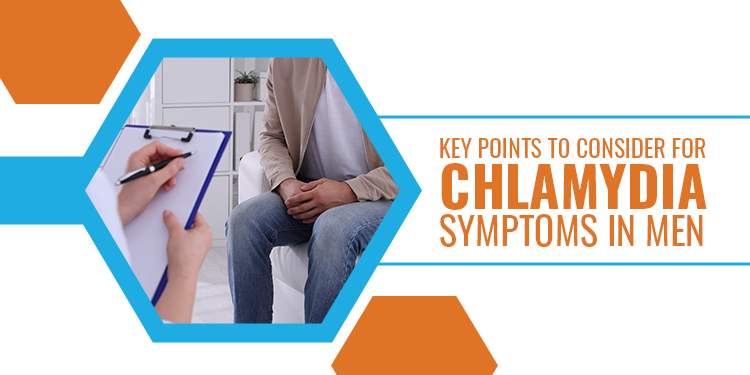- Suite 17, 117A Harley Street London, W1G 6AT
- 020 34751653
- Monday - Friday
9:00 - 18:00 - Saturday - Sunday
10:00 - 14:00

Chlamydia Trachomatis, a bacterial organism, causes a sexually transmitted infection, or STI, that can lead to health issues in both men and women. There are nearly 2.8 million new infections each year and 50% of men won’t display the symptoms. The only way you will know if you have Chlamydia is by undergoing a test.
Chlamydia can spread through anal, oral or vaginal sex with someone who has the infection. Semen does not need to be present to acquire or spread this infection. Men who have sex with other men are vulnerable to getting and transmitting Chlamydia.
At least half of men who suffer from Chlamydia do not experience any symptoms. If they do get the symptoms, the most common ones include:
In some cases Chlamydia infection can spread to the testicles and epididymis causing them to become swollen and painful. This is called epididymitis or epididymal-orchitis.
Chlamydia may even sometimes trigger reactive arthritis. Reactive arthritis causes swelling (inflammation) in joints in your body, particularly the feet, knees, ankles, toes and hips. In most cases, it will clear up in a few months and cause no problems in the long term. Both men and women of any age may get it, though it is more common in men and people who are between 20 and 40 years old.
Men are at risk of experiencing infertility if their Chlamydia infection is not treated quickly. Untreated Chlamydia can cause several major consequences to your health including increased susceptibility to AIDS/HIV. If you do not have treatment, you are not only putting your health at risk but also that of your partner.
Infertility is also a major consequence for women who are suffering from Chlamydia that remains undetected, so it is wise to get tested whether you show any symptoms or not.
You should test for different sexually transmitted infections if you have unprotected sex with new or multiple partners. This is particularly true for men who have had sex with men (MSM). MSM along with those who suffer from HIV, should have more frequent screening for Chlamydia - every 3 to 6 months. This is necessary particularly if there are multiple sexual partners.
There are several options in Chlamydia testing for men. You can visit your healthcare provider who will take a urine sample or a swab from your penis /rectum and then send it to the laboratory for testing. The results are usually back in a few days. It is advisable that you refrain from sexual activity until you get the results.
The positive news is that taking antibiotics such as doxycycline or azithromycin treat chlamydia infections easily. Refrain from sexual activity for at least 7 days to avoid getting infected again. Make sure your partner is also being treated at the same time.
It is advisable to retest approximately 3 to 4 weeks after treatment to check that you are clear of infection. Many people suffer from chlamydia reinfection within the first few months after treatment. You should understand the serious consequences of chlamydia such as infertility in men and women as well as arthritis and conjunctivitis.
Total abstinence is the best way to prevent Chlamydia exposure but a more realistic method is safe sex, using a latex condom every time you have sex with your partner. Make sure you use condoms so that you and your partner can have safe sex.
If you are in a mutually monogamous relationship with a partner who has already been tested and does not suffer from chlamydia, there is no risk of you developing Chlamydia. If you need to you can use an at-home chlamydia test. It is advisable that you get tested for STIs for men here and know whether or not you have the infection if your sexual activity is that of having sex with more than one partner.
Our Sexual Health Clinic is located on Harley Street in the heart of London.
We are only a 5 minutes walk from Regents Park station, 10 minutes from Great Portland Street and 15 minutes from Oxford Circus.